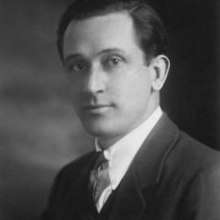Ralph Monroe Eaton
Ralph Monroe Eaton (June 28, 1892 – April 13, 1932) was an American philosopher of Harvard University whose career was cut short at the age of 39. He specialised in the theory of knowledge and logic but later became interested in psychoanalysis. He served in the United States Army during the First World War and wrote an unpublished memoir of his experiences.

Early life and marriage
Ralph Monroe Eaton was born on June 28, 1892, in Stockton, California. He was educated at the University of California, Berkeley (Litt. B., 1914) and Harvard University (A.M., 1915 and Ph.D., April 28, 1917).[1] He married Hortense Bissell in 1922, and had a daughter Virginia Eaton Blair, in September 17, 1923. The marriage was not successful and ended in separation.[2]
First World War
Eaton applied for admission to the Officers' Training Camp at Plattsburgh, New York in early 1917 and was commissioned as a second lieutenant. He was posted to the 103rd Infantry Regiment and travelled to France with the 26th "Yankee" Division. He served as an officer of the line and was promoted to first lieutenant in which capacity he was responsible for the regimental supply company. His regiment saw action at Saint-Mihiel and in the Argonne.[3]
After the war, he wrote an unpublished memoir of his experiences, Backward glances of a demobilized soldier, in which he described the "romance in modern warfare ... a saga of vaster proportions than ever before; a tremendous drama of men and mechanisms"[4] but also of his first experience of death in war when his sergeant:
... lay like a beautiful slaughtered animal, this boy whom I had loved and had beside me, his gashed and bloody head supported in the trembling arms of a comrade. He opened pained eyes and spoke my name, as I felt his shivering body for the more fatal wound which I knew he must have in the chest. And then, when he had been lifted to a stretcher, after they had carried him away to the dressing station, I went into my abri [bunker] and wept as I have not wept before or since. A day later we buried him at Vaucresson.[4]
Academic career
Eaton began his career as assistant in philosophy at Harvard University from 1915 to 1916, rising to assistant professor in 1926, after the interruption of military service. He was also an assistant professor at Radcliffe College.[1]
He was a Guggenheim Fellow in 1926, awarded for a study of the "philosophy, particularly the theory of knowledge in its relation to logic and metaphysics, with Professor E. Husserl and the phenomenological school of German philosophers, principally at the University of Freiburg, Germany; and for the writing in English of a critical account of the philosophy of this school".[1]
His first interests were in the scientific method and logic[3] and his first book, Symbolism and Truth (1925), was an epistemological study that used logic to explore philosophy. It was compared to Wittgenstein's Tractatus in its preoccupations. In General Logic (1931), Eaton dealt with symbolic logic as well as the Aristotelian idea of logic and inductive logic. On the basis of the works, Harvard promoted Eaton to associate professor in February 1930, but soon afterwards he was found drunk in his room, depressed over the failure of his marriage, and with obscenities marked on the walls by his companions. As a result, in March the university withdrew his promotion, declared him emotionally unstable, and put him on leave until the start of the 1931–32 academic year. In addition, his contract as an assistant professor was not renewed at the end of that academic year.[2] Around this time, he became interested in psychoanalysis and the break from his Harvard duties allowed him to translate and write a preface to Secret Ways of the Mind by Wolfgang Müller Kranefeldt, with an introduction by Carl Jung, which was published in early 1932.[5]
Death
In April 1932, Eaton dismissed a class at Radcliffe due to dizziness. At the insistence of friends, he checked into a hospital for a night, but escaped the next morning. A group of colleagues found his body in a forest in West Concord, where he had cut his throat.[5][6][7]
Selected publications
- Symbolism and truth: An introduction to the theory of knowledge. Harvard University Press, Cambridge, MA, 1925.
- Selections from Descartes. Scribner's, 1927. (editor) (The Modern Student's Library)
- General logic: An introductory survey. Scribner's, 1931.
See also
References
- Ralph Monroe Eaton. John Simon Guggenheim Memorial Foundation. Retrieved October 27, 2016.
- Kuklick, Bruce. (1977) The rise of American philosophy: Cambridge, Massachusetts, 1860–1930. New Haven: Yale University Press. pp. 438–9. ISBN 978-0-300-02039-7
- "Eastern Division", The Philosophical Review, Vol. 6 (1932), pp. 209–13.
- Called Upon To Have Courage. The Washington Post, November 11, 2001. Retrieved November 2, 2016.
- "Notes and News", The Journal of Philosophy, Vol. 29, No. 10 (May 12, 1932), p. 280.
- Bailey, Blake. (2013) Farther and Wilder: The Lost Weekends and Literary Dreams of Charles Jackson. New York: Alfred A. Knopf. p. 77. ISBN 978-0-307-27358-1
- "Eaton on the problem of negation", Jonathan D. Moreno, Transactions of the Charles S. Peirce Society, Vol. 16, No. 1 (Winter, 1980), pp. 59–72.